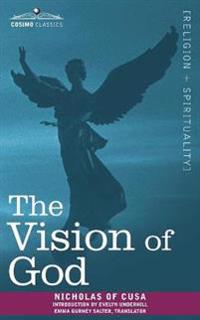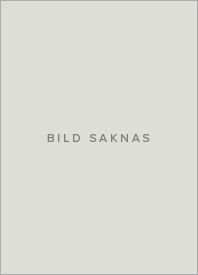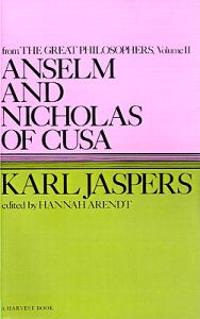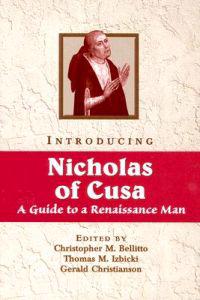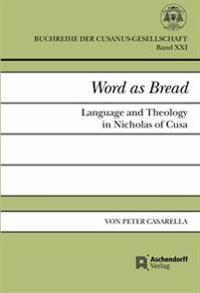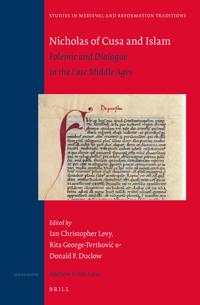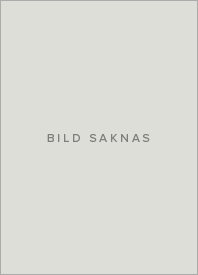Nicholas of Cusa (Pocket)
avof Cusa Nicholas, H. Lawrence (TRN) Bond, of Cusa Nicholas
ISBN: 9780809136988 - UTGIVEN: 1997-04Nicholas of Cusa and the Making of the Early Modern World
ISBN: 9789004343016 - UTGIVEN: 2019-02List of Illustrations Abbreviations Notes on Contributors Nicholas of Cusa: The Life of a Reformer Simon J.G. Burton, Joshua Hollmann, and Eric M. Parker Introduction: Nicholas of Cusa and Early Modern Reform: towards a Reassessment Simon J.G. Burton, Joshua Hollmann, and Eric M. Parker Part 1 Refor[...]
Anselm and Nicholas of Cusa (Häftad)
avKarl Jaspers, Ralph Jaspers, Hannah Arendt
ISBN: 9780156076005 - UTGIVEN: 1974-10Taken from the Great Philosphers, Volume II.
Introducing Nicholas of Cusa
ISBN: 9780809141395 - UTGIVEN: 2004-05Nicholas of Cusa (1401-1464) was one of the most illustrious figures of the fifteenth century --a man whose imagination spanned the late Middle Ages and the Renaissance to point the way to modernity. Theologian, philosopher, canon lawyer, reformer, church statesman, and cardinal, Cusanus' ideas of l[...]
Nicholas of Cusa (Pocket)
avErich Meuthen, David (TRN) Crowner, Gerald (TRN) Christianson
ISBN: 9780813217871 - UTGIVEN: 2010-09This translation of Erich Meuthens well-known biography of Nicholas of Cusa presents the foremost summary of Cusanuss life and thought. From its original edition in 1964 through its seventh edition in 1992, Meuthens sketch has found an appreciative audience. As Meuthen takes readers through Cusanuss[...]
Nicholas of Cusa
ISBN: 9781138871304 - UTGIVEN: 2015-02Nicholas of Cusa (1401 64), doctor of canon law, church politician and philosopher, was one of the most important thinkers of 15th century Europe. This year marks the sixth centenary of his birth. Scholars from round the globe gathered in Tokyo for the 19th Cusanus Congress last year; this volume ma[...]
Nicholas of Cusa: A Companion to His Life and His Times (Inbunden)
avMorimichi Watanabe
ISBN: 9781409420392 - UTGIVEN: 2011-10-19Word as Bread: Language and Theology in Nicholas of Cusa (häftad)
ISBN: 9783402031681 - UTGIVEN: 2017-03This study examines the Verbum speculation of Nicholas of Cusa. The investigation concentrates equally on the concept of language that he inherited from medieval and Quattrocento sources and on the Christian theology of the Word that he wove together using his own resources and distinctive approache[...]
Nicholas of Cusa: Trinity, Freedom and Dialogue (häftad)
ISBN: 9783402159996 - UTGIVEN: 2016-03Trinity, freedom and dialogue not only represent three themes of Nicholas Cusanus' thought, but provide a possible hermeneutic key to reading his work and understanding his philosophy. Through a historico-philological and theoretico-speculative investigation, an attempt is made to investigate Cusanu[...]
Nicholas of Cusa and Islam: Polemic and Dialogue in the Late Middle Ages
ISBN: 9789004274754 - UTGIVEN: 2014-06The Religious Concordance: Nicholas of Cusa and Christian-Muslim Dialogue
ISBN: 9789004326774 - UTGIVEN: 2017-05In The Religious Concordance: Nicholas of Cusa and Christian-Muslim Dialogue, Joshua Hollmann examines Nicholas of Cusa's unique Christocentric approach to Islam. While many late medieval Christians responded to the fall of Constantinople with polemic, Nicholas of Cusa wrote a peaceful dialogue (De [...]


